Critical Analysis of UK Food Consumption: Socio-Cultural Influences
VerifiedAdded on 2023/01/12
|9
|2750
|84
Essay
AI Summary
This essay provides a comprehensive analysis of socio-cultural influences on food consumption within the United Kingdom. It examines the impact of various factors, including societal pressures, cultural practices, external environmental influences such as food availability and promotion, and the role of government policies. The essay critically evaluates the effects of these factors on food consumption patterns, including the prevalence of fast food, obesity rates, and food waste. It also explores the impact of socio-economic status and the government's efforts to promote sustainable food consumption. Furthermore, the essay offers recommendations for potential measures to improve current food consumption policies, focusing on urban food governance, consumer attitudes towards food waste, and the prevention and management of food waste. The analysis highlights the need for a multifaceted approach to address the challenges related to food consumption in the UK, considering both positive and negative implications of the influencing factors.

ESSAY
Paraphrase This Document
Need a fresh take? Get an instant paraphrase of this document with our AI Paraphraser
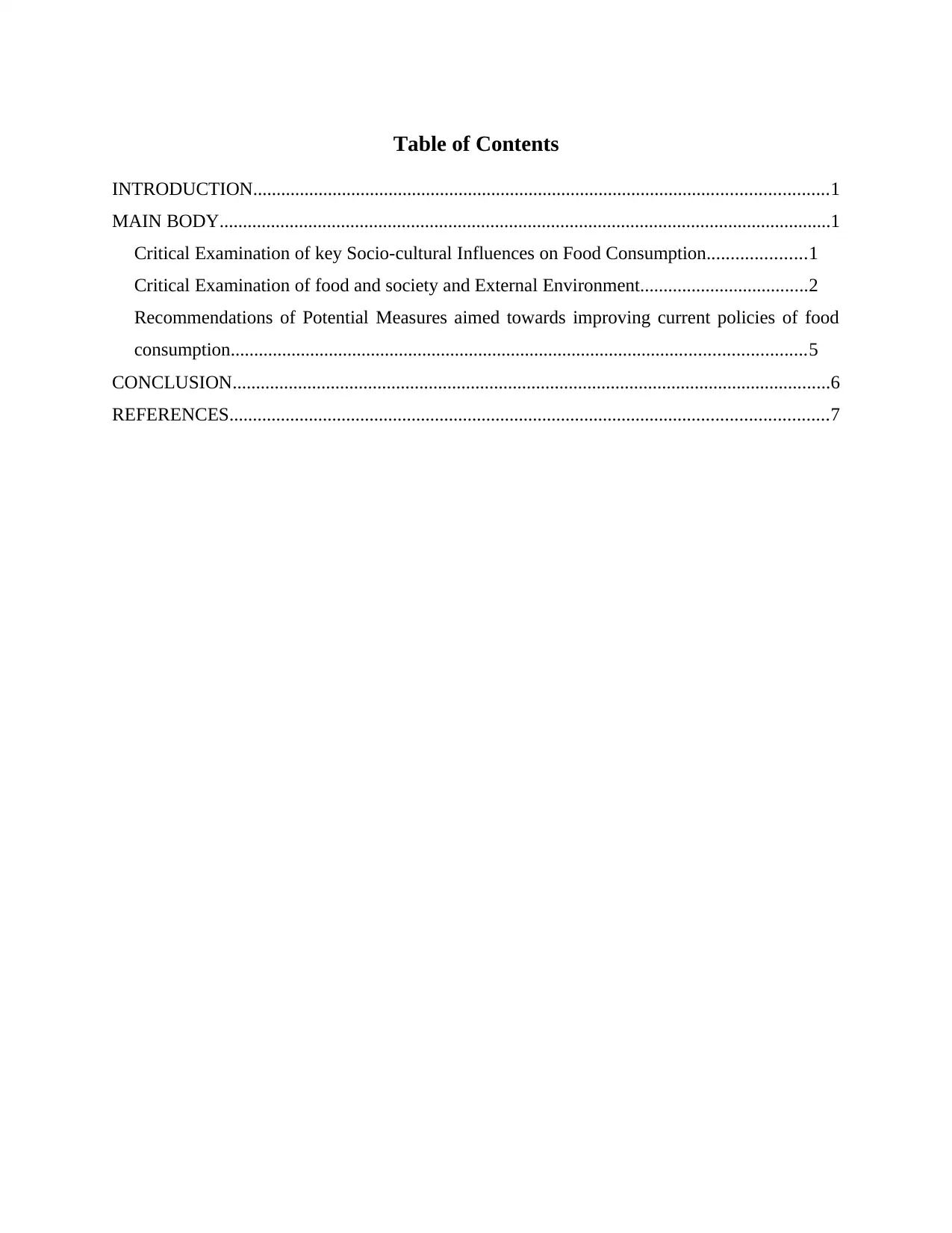
Table of Contents
INTRODUCTION...........................................................................................................................1
MAIN BODY...................................................................................................................................1
Critical Examination of key Socio-cultural Influences on Food Consumption.....................1
Critical Examination of food and society and External Environment....................................2
Recommendations of Potential Measures aimed towards improving current policies of food
consumption...........................................................................................................................5
CONCLUSION................................................................................................................................6
REFERENCES................................................................................................................................7
INTRODUCTION...........................................................................................................................1
MAIN BODY...................................................................................................................................1
Critical Examination of key Socio-cultural Influences on Food Consumption.....................1
Critical Examination of food and society and External Environment....................................2
Recommendations of Potential Measures aimed towards improving current policies of food
consumption...........................................................................................................................5
CONCLUSION................................................................................................................................6
REFERENCES................................................................................................................................7
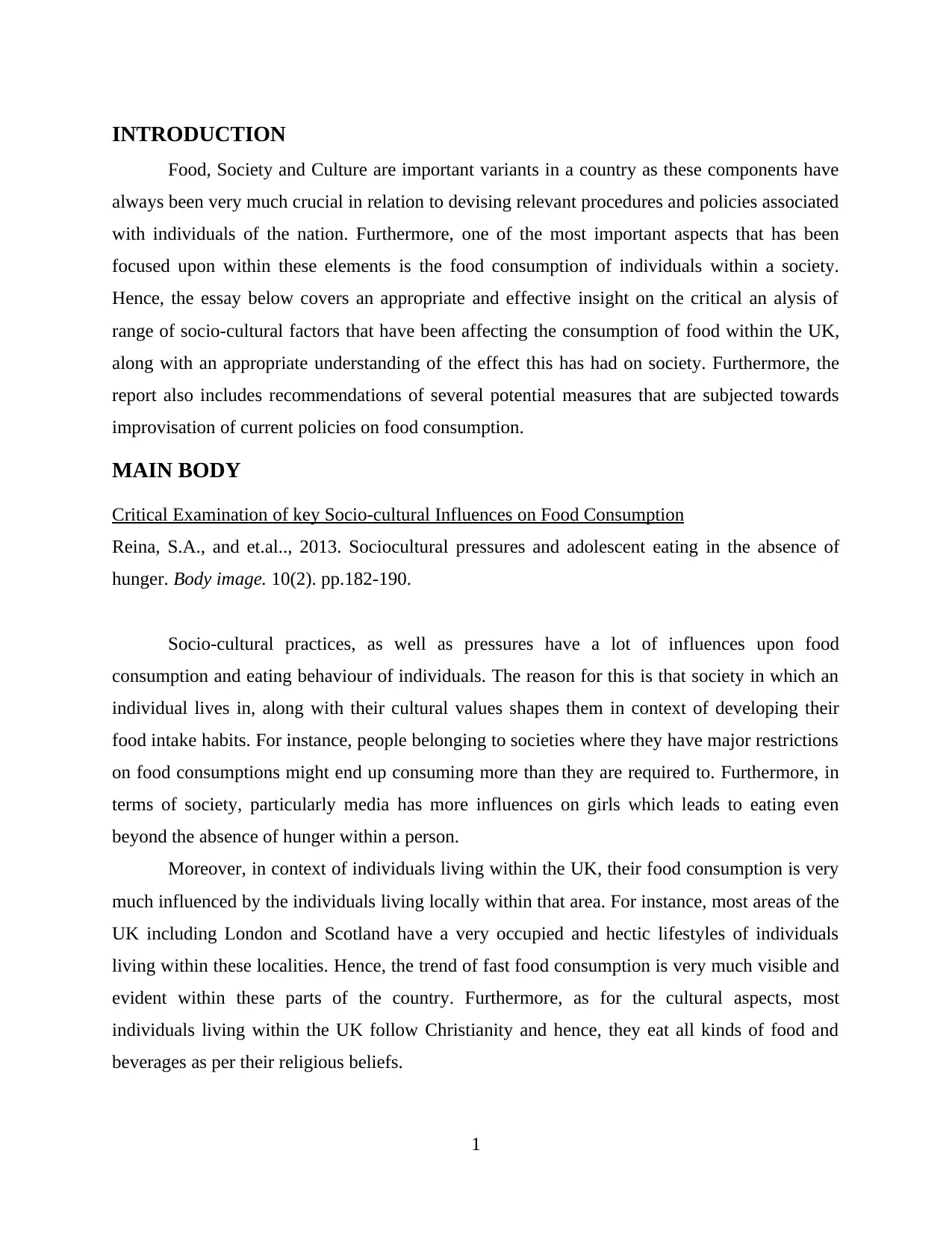
INTRODUCTION
Food, Society and Culture are important variants in a country as these components have
always been very much crucial in relation to devising relevant procedures and policies associated
with individuals of the nation. Furthermore, one of the most important aspects that has been
focused upon within these elements is the food consumption of individuals within a society.
Hence, the essay below covers an appropriate and effective insight on the critical an alysis of
range of socio-cultural factors that have been affecting the consumption of food within the UK,
along with an appropriate understanding of the effect this has had on society. Furthermore, the
report also includes recommendations of several potential measures that are subjected towards
improvisation of current policies on food consumption.
MAIN BODY
Critical Examination of key Socio-cultural Influences on Food Consumption
Reina, S.A., and et.al.., 2013. Sociocultural pressures and adolescent eating in the absence of
hunger. Body image. 10(2). pp.182-190.
Socio-cultural practices, as well as pressures have a lot of influences upon food
consumption and eating behaviour of individuals. The reason for this is that society in which an
individual lives in, along with their cultural values shapes them in context of developing their
food intake habits. For instance, people belonging to societies where they have major restrictions
on food consumptions might end up consuming more than they are required to. Furthermore, in
terms of society, particularly media has more influences on girls which leads to eating even
beyond the absence of hunger within a person.
Moreover, in context of individuals living within the UK, their food consumption is very
much influenced by the individuals living locally within that area. For instance, most areas of the
UK including London and Scotland have a very occupied and hectic lifestyles of individuals
living within these localities. Hence, the trend of fast food consumption is very much visible and
evident within these parts of the country. Furthermore, as for the cultural aspects, most
individuals living within the UK follow Christianity and hence, they eat all kinds of food and
beverages as per their religious beliefs.
1
Food, Society and Culture are important variants in a country as these components have
always been very much crucial in relation to devising relevant procedures and policies associated
with individuals of the nation. Furthermore, one of the most important aspects that has been
focused upon within these elements is the food consumption of individuals within a society.
Hence, the essay below covers an appropriate and effective insight on the critical an alysis of
range of socio-cultural factors that have been affecting the consumption of food within the UK,
along with an appropriate understanding of the effect this has had on society. Furthermore, the
report also includes recommendations of several potential measures that are subjected towards
improvisation of current policies on food consumption.
MAIN BODY
Critical Examination of key Socio-cultural Influences on Food Consumption
Reina, S.A., and et.al.., 2013. Sociocultural pressures and adolescent eating in the absence of
hunger. Body image. 10(2). pp.182-190.
Socio-cultural practices, as well as pressures have a lot of influences upon food
consumption and eating behaviour of individuals. The reason for this is that society in which an
individual lives in, along with their cultural values shapes them in context of developing their
food intake habits. For instance, people belonging to societies where they have major restrictions
on food consumptions might end up consuming more than they are required to. Furthermore, in
terms of society, particularly media has more influences on girls which leads to eating even
beyond the absence of hunger within a person.
Moreover, in context of individuals living within the UK, their food consumption is very
much influenced by the individuals living locally within that area. For instance, most areas of the
UK including London and Scotland have a very occupied and hectic lifestyles of individuals
living within these localities. Hence, the trend of fast food consumption is very much visible and
evident within these parts of the country. Furthermore, as for the cultural aspects, most
individuals living within the UK follow Christianity and hence, they eat all kinds of food and
beverages as per their religious beliefs.
1
⊘ This is a preview!⊘
Do you want full access?
Subscribe today to unlock all pages.

Trusted by 1+ million students worldwide
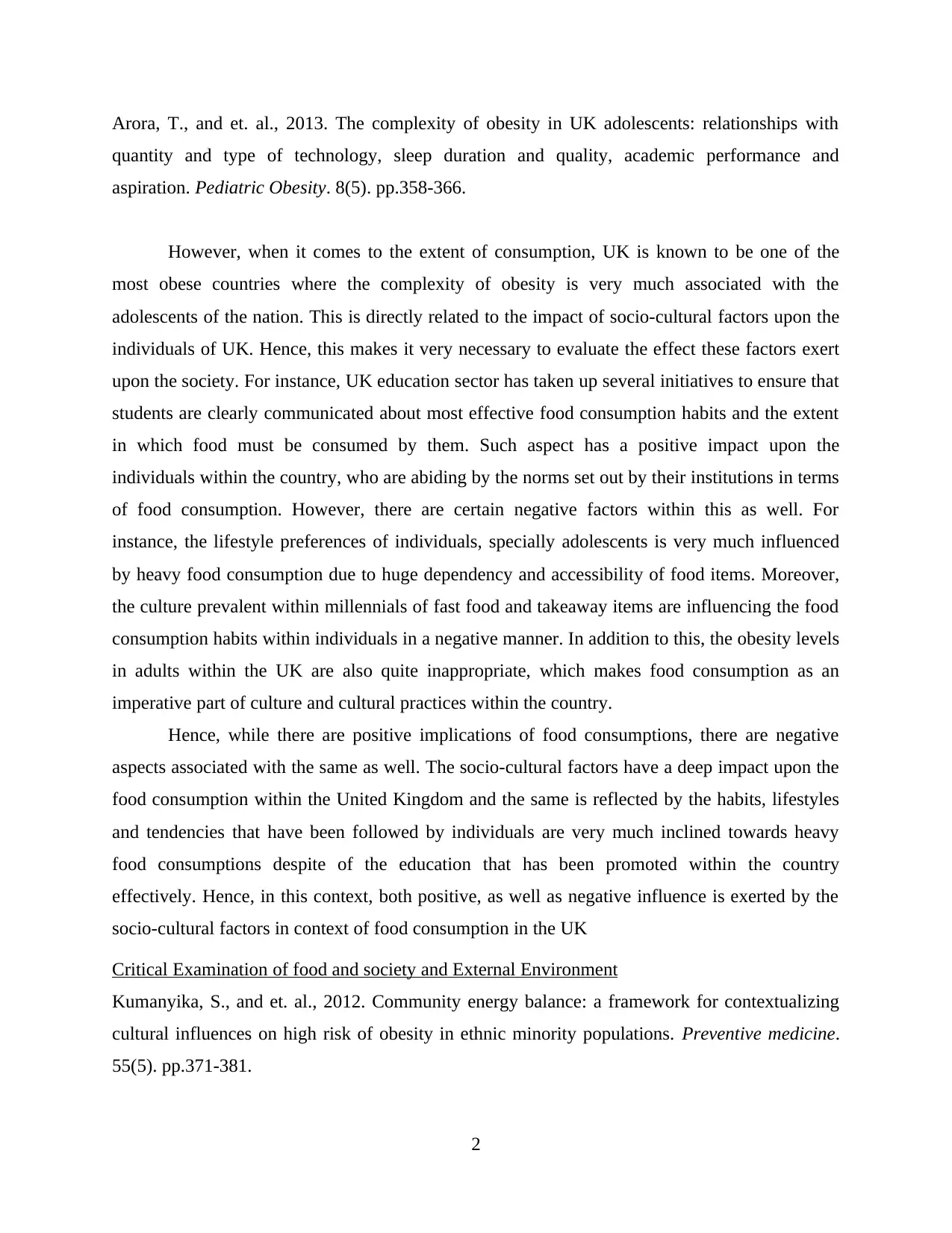
Arora, T., and et. al., 2013. The complexity of obesity in UK adolescents: relationships with
quantity and type of technology, sleep duration and quality, academic performance and
aspiration. Pediatric Obesity. 8(5). pp.358-366.
However, when it comes to the extent of consumption, UK is known to be one of the
most obese countries where the complexity of obesity is very much associated with the
adolescents of the nation. This is directly related to the impact of socio-cultural factors upon the
individuals of UK. Hence, this makes it very necessary to evaluate the effect these factors exert
upon the society. For instance, UK education sector has taken up several initiatives to ensure that
students are clearly communicated about most effective food consumption habits and the extent
in which food must be consumed by them. Such aspect has a positive impact upon the
individuals within the country, who are abiding by the norms set out by their institutions in terms
of food consumption. However, there are certain negative factors within this as well. For
instance, the lifestyle preferences of individuals, specially adolescents is very much influenced
by heavy food consumption due to huge dependency and accessibility of food items. Moreover,
the culture prevalent within millennials of fast food and takeaway items are influencing the food
consumption habits within individuals in a negative manner. In addition to this, the obesity levels
in adults within the UK are also quite inappropriate, which makes food consumption as an
imperative part of culture and cultural practices within the country.
Hence, while there are positive implications of food consumptions, there are negative
aspects associated with the same as well. The socio-cultural factors have a deep impact upon the
food consumption within the United Kingdom and the same is reflected by the habits, lifestyles
and tendencies that have been followed by individuals are very much inclined towards heavy
food consumptions despite of the education that has been promoted within the country
effectively. Hence, in this context, both positive, as well as negative influence is exerted by the
socio-cultural factors in context of food consumption in the UK
Critical Examination of food and society and External Environment
Kumanyika, S., and et. al., 2012. Community energy balance: a framework for contextualizing
cultural influences on high risk of obesity in ethnic minority populations. Preventive medicine.
55(5). pp.371-381.
2
quantity and type of technology, sleep duration and quality, academic performance and
aspiration. Pediatric Obesity. 8(5). pp.358-366.
However, when it comes to the extent of consumption, UK is known to be one of the
most obese countries where the complexity of obesity is very much associated with the
adolescents of the nation. This is directly related to the impact of socio-cultural factors upon the
individuals of UK. Hence, this makes it very necessary to evaluate the effect these factors exert
upon the society. For instance, UK education sector has taken up several initiatives to ensure that
students are clearly communicated about most effective food consumption habits and the extent
in which food must be consumed by them. Such aspect has a positive impact upon the
individuals within the country, who are abiding by the norms set out by their institutions in terms
of food consumption. However, there are certain negative factors within this as well. For
instance, the lifestyle preferences of individuals, specially adolescents is very much influenced
by heavy food consumption due to huge dependency and accessibility of food items. Moreover,
the culture prevalent within millennials of fast food and takeaway items are influencing the food
consumption habits within individuals in a negative manner. In addition to this, the obesity levels
in adults within the UK are also quite inappropriate, which makes food consumption as an
imperative part of culture and cultural practices within the country.
Hence, while there are positive implications of food consumptions, there are negative
aspects associated with the same as well. The socio-cultural factors have a deep impact upon the
food consumption within the United Kingdom and the same is reflected by the habits, lifestyles
and tendencies that have been followed by individuals are very much inclined towards heavy
food consumptions despite of the education that has been promoted within the country
effectively. Hence, in this context, both positive, as well as negative influence is exerted by the
socio-cultural factors in context of food consumption in the UK
Critical Examination of food and society and External Environment
Kumanyika, S., and et. al., 2012. Community energy balance: a framework for contextualizing
cultural influences on high risk of obesity in ethnic minority populations. Preventive medicine.
55(5). pp.371-381.
2
Paraphrase This Document
Need a fresh take? Get an instant paraphrase of this document with our AI Paraphraser
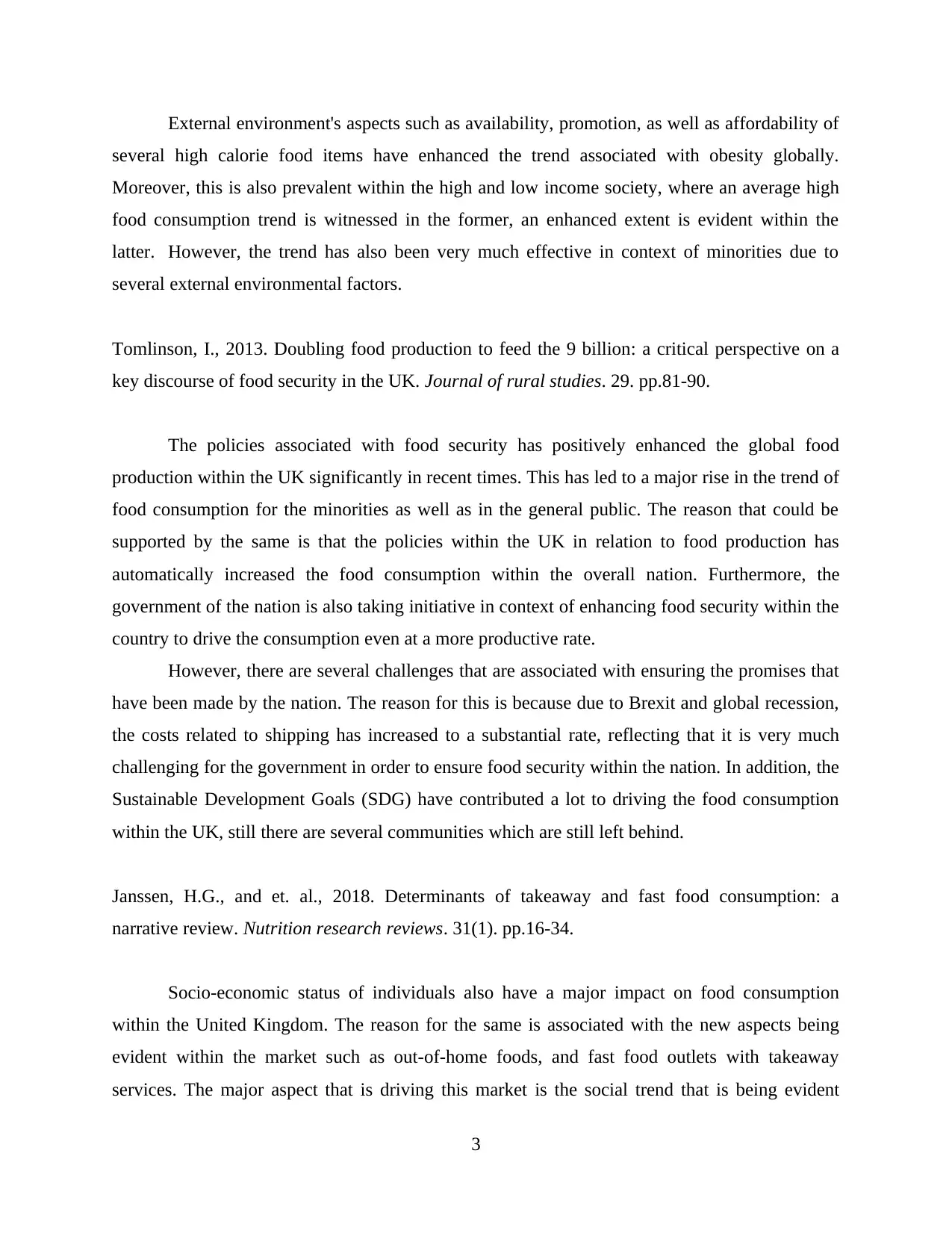
External environment's aspects such as availability, promotion, as well as affordability of
several high calorie food items have enhanced the trend associated with obesity globally.
Moreover, this is also prevalent within the high and low income society, where an average high
food consumption trend is witnessed in the former, an enhanced extent is evident within the
latter. However, the trend has also been very much effective in context of minorities due to
several external environmental factors.
Tomlinson, I., 2013. Doubling food production to feed the 9 billion: a critical perspective on a
key discourse of food security in the UK. Journal of rural studies. 29. pp.81-90.
The policies associated with food security has positively enhanced the global food
production within the UK significantly in recent times. This has led to a major rise in the trend of
food consumption for the minorities as well as in the general public. The reason that could be
supported by the same is that the policies within the UK in relation to food production has
automatically increased the food consumption within the overall nation. Furthermore, the
government of the nation is also taking initiative in context of enhancing food security within the
country to drive the consumption even at a more productive rate.
However, there are several challenges that are associated with ensuring the promises that
have been made by the nation. The reason for this is because due to Brexit and global recession,
the costs related to shipping has increased to a substantial rate, reflecting that it is very much
challenging for the government in order to ensure food security within the nation. In addition, the
Sustainable Development Goals (SDG) have contributed a lot to driving the food consumption
within the UK, still there are several communities which are still left behind.
Janssen, H.G., and et. al., 2018. Determinants of takeaway and fast food consumption: a
narrative review. Nutrition research reviews. 31(1). pp.16-34.
Socio-economic status of individuals also have a major impact on food consumption
within the United Kingdom. The reason for the same is associated with the new aspects being
evident within the market such as out-of-home foods, and fast food outlets with takeaway
services. The major aspect that is driving this market is the social trend that is being evident
3
several high calorie food items have enhanced the trend associated with obesity globally.
Moreover, this is also prevalent within the high and low income society, where an average high
food consumption trend is witnessed in the former, an enhanced extent is evident within the
latter. However, the trend has also been very much effective in context of minorities due to
several external environmental factors.
Tomlinson, I., 2013. Doubling food production to feed the 9 billion: a critical perspective on a
key discourse of food security in the UK. Journal of rural studies. 29. pp.81-90.
The policies associated with food security has positively enhanced the global food
production within the UK significantly in recent times. This has led to a major rise in the trend of
food consumption for the minorities as well as in the general public. The reason that could be
supported by the same is that the policies within the UK in relation to food production has
automatically increased the food consumption within the overall nation. Furthermore, the
government of the nation is also taking initiative in context of enhancing food security within the
country to drive the consumption even at a more productive rate.
However, there are several challenges that are associated with ensuring the promises that
have been made by the nation. The reason for this is because due to Brexit and global recession,
the costs related to shipping has increased to a substantial rate, reflecting that it is very much
challenging for the government in order to ensure food security within the nation. In addition, the
Sustainable Development Goals (SDG) have contributed a lot to driving the food consumption
within the UK, still there are several communities which are still left behind.
Janssen, H.G., and et. al., 2018. Determinants of takeaway and fast food consumption: a
narrative review. Nutrition research reviews. 31(1). pp.16-34.
Socio-economic status of individuals also have a major impact on food consumption
within the United Kingdom. The reason for the same is associated with the new aspects being
evident within the market such as out-of-home foods, and fast food outlets with takeaway
services. The major aspect that is driving this market is the social trend that is being evident
3
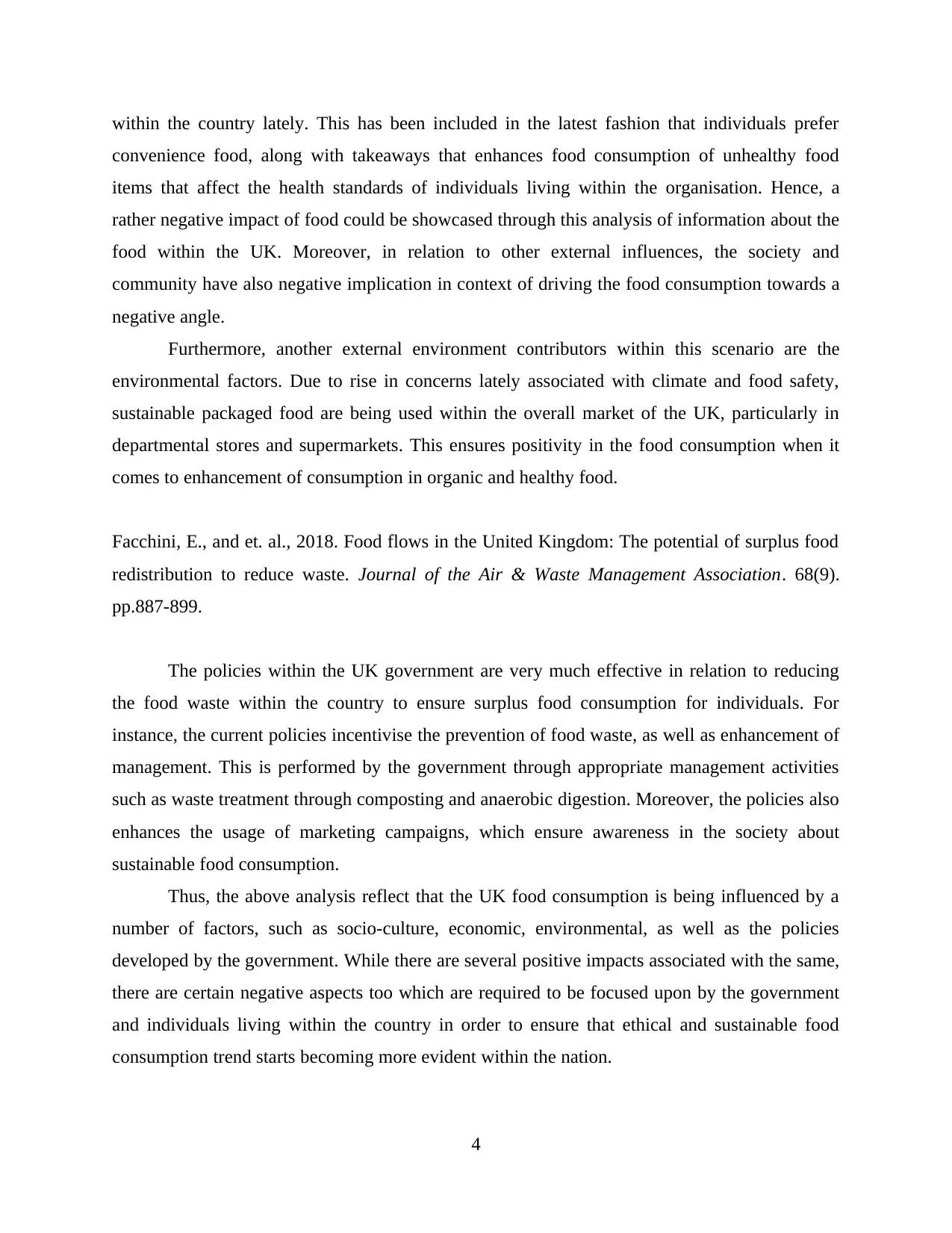
within the country lately. This has been included in the latest fashion that individuals prefer
convenience food, along with takeaways that enhances food consumption of unhealthy food
items that affect the health standards of individuals living within the organisation. Hence, a
rather negative impact of food could be showcased through this analysis of information about the
food within the UK. Moreover, in relation to other external influences, the society and
community have also negative implication in context of driving the food consumption towards a
negative angle.
Furthermore, another external environment contributors within this scenario are the
environmental factors. Due to rise in concerns lately associated with climate and food safety,
sustainable packaged food are being used within the overall market of the UK, particularly in
departmental stores and supermarkets. This ensures positivity in the food consumption when it
comes to enhancement of consumption in organic and healthy food.
Facchini, E., and et. al., 2018. Food flows in the United Kingdom: The potential of surplus food
redistribution to reduce waste. Journal of the Air & Waste Management Association. 68(9).
pp.887-899.
The policies within the UK government are very much effective in relation to reducing
the food waste within the country to ensure surplus food consumption for individuals. For
instance, the current policies incentivise the prevention of food waste, as well as enhancement of
management. This is performed by the government through appropriate management activities
such as waste treatment through composting and anaerobic digestion. Moreover, the policies also
enhances the usage of marketing campaigns, which ensure awareness in the society about
sustainable food consumption.
Thus, the above analysis reflect that the UK food consumption is being influenced by a
number of factors, such as socio-culture, economic, environmental, as well as the policies
developed by the government. While there are several positive impacts associated with the same,
there are certain negative aspects too which are required to be focused upon by the government
and individuals living within the country in order to ensure that ethical and sustainable food
consumption trend starts becoming more evident within the nation.
4
convenience food, along with takeaways that enhances food consumption of unhealthy food
items that affect the health standards of individuals living within the organisation. Hence, a
rather negative impact of food could be showcased through this analysis of information about the
food within the UK. Moreover, in relation to other external influences, the society and
community have also negative implication in context of driving the food consumption towards a
negative angle.
Furthermore, another external environment contributors within this scenario are the
environmental factors. Due to rise in concerns lately associated with climate and food safety,
sustainable packaged food are being used within the overall market of the UK, particularly in
departmental stores and supermarkets. This ensures positivity in the food consumption when it
comes to enhancement of consumption in organic and healthy food.
Facchini, E., and et. al., 2018. Food flows in the United Kingdom: The potential of surplus food
redistribution to reduce waste. Journal of the Air & Waste Management Association. 68(9).
pp.887-899.
The policies within the UK government are very much effective in relation to reducing
the food waste within the country to ensure surplus food consumption for individuals. For
instance, the current policies incentivise the prevention of food waste, as well as enhancement of
management. This is performed by the government through appropriate management activities
such as waste treatment through composting and anaerobic digestion. Moreover, the policies also
enhances the usage of marketing campaigns, which ensure awareness in the society about
sustainable food consumption.
Thus, the above analysis reflect that the UK food consumption is being influenced by a
number of factors, such as socio-culture, economic, environmental, as well as the policies
developed by the government. While there are several positive impacts associated with the same,
there are certain negative aspects too which are required to be focused upon by the government
and individuals living within the country in order to ensure that ethical and sustainable food
consumption trend starts becoming more evident within the nation.
4
⊘ This is a preview!⊘
Do you want full access?
Subscribe today to unlock all pages.

Trusted by 1+ million students worldwide
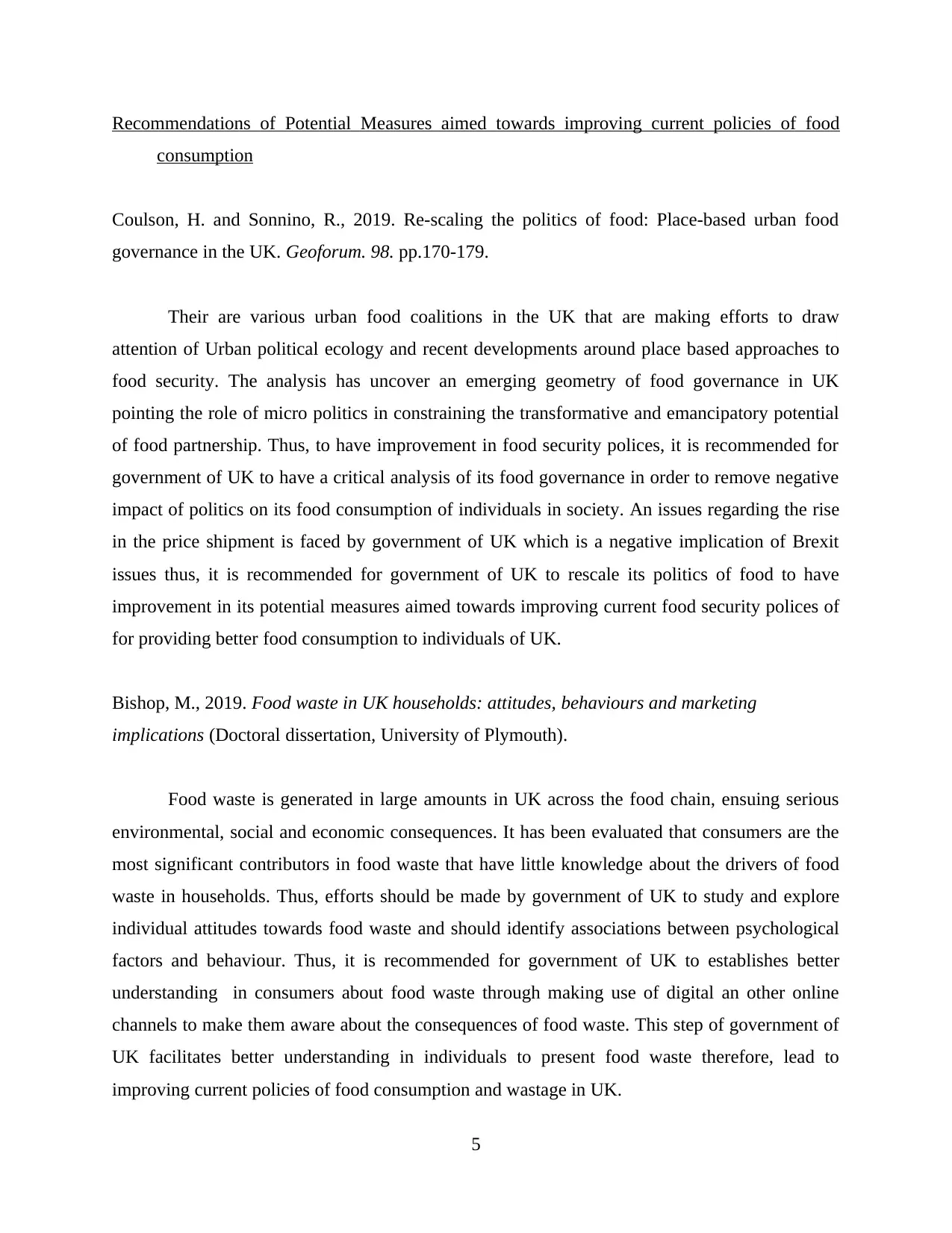
Recommendations of Potential Measures aimed towards improving current policies of food
consumption
Coulson, H. and Sonnino, R., 2019. Re-scaling the politics of food: Place-based urban food
governance in the UK. Geoforum. 98. pp.170-179.
Their are various urban food coalitions in the UK that are making efforts to draw
attention of Urban political ecology and recent developments around place based approaches to
food security. The analysis has uncover an emerging geometry of food governance in UK
pointing the role of micro politics in constraining the transformative and emancipatory potential
of food partnership. Thus, to have improvement in food security polices, it is recommended for
government of UK to have a critical analysis of its food governance in order to remove negative
impact of politics on its food consumption of individuals in society. An issues regarding the rise
in the price shipment is faced by government of UK which is a negative implication of Brexit
issues thus, it is recommended for government of UK to rescale its politics of food to have
improvement in its potential measures aimed towards improving current food security polices of
for providing better food consumption to individuals of UK.
Bishop, M., 2019. Food waste in UK households: attitudes, behaviours and marketing
implications (Doctoral dissertation, University of Plymouth).
Food waste is generated in large amounts in UK across the food chain, ensuing serious
environmental, social and economic consequences. It has been evaluated that consumers are the
most significant contributors in food waste that have little knowledge about the drivers of food
waste in households. Thus, efforts should be made by government of UK to study and explore
individual attitudes towards food waste and should identify associations between psychological
factors and behaviour. Thus, it is recommended for government of UK to establishes better
understanding in consumers about food waste through making use of digital an other online
channels to make them aware about the consequences of food waste. This step of government of
UK facilitates better understanding in individuals to present food waste therefore, lead to
improving current policies of food consumption and wastage in UK.
5
consumption
Coulson, H. and Sonnino, R., 2019. Re-scaling the politics of food: Place-based urban food
governance in the UK. Geoforum. 98. pp.170-179.
Their are various urban food coalitions in the UK that are making efforts to draw
attention of Urban political ecology and recent developments around place based approaches to
food security. The analysis has uncover an emerging geometry of food governance in UK
pointing the role of micro politics in constraining the transformative and emancipatory potential
of food partnership. Thus, to have improvement in food security polices, it is recommended for
government of UK to have a critical analysis of its food governance in order to remove negative
impact of politics on its food consumption of individuals in society. An issues regarding the rise
in the price shipment is faced by government of UK which is a negative implication of Brexit
issues thus, it is recommended for government of UK to rescale its politics of food to have
improvement in its potential measures aimed towards improving current food security polices of
for providing better food consumption to individuals of UK.
Bishop, M., 2019. Food waste in UK households: attitudes, behaviours and marketing
implications (Doctoral dissertation, University of Plymouth).
Food waste is generated in large amounts in UK across the food chain, ensuing serious
environmental, social and economic consequences. It has been evaluated that consumers are the
most significant contributors in food waste that have little knowledge about the drivers of food
waste in households. Thus, efforts should be made by government of UK to study and explore
individual attitudes towards food waste and should identify associations between psychological
factors and behaviour. Thus, it is recommended for government of UK to establishes better
understanding in consumers about food waste through making use of digital an other online
channels to make them aware about the consequences of food waste. This step of government of
UK facilitates better understanding in individuals to present food waste therefore, lead to
improving current policies of food consumption and wastage in UK.
5
Paraphrase This Document
Need a fresh take? Get an instant paraphrase of this document with our AI Paraphraser
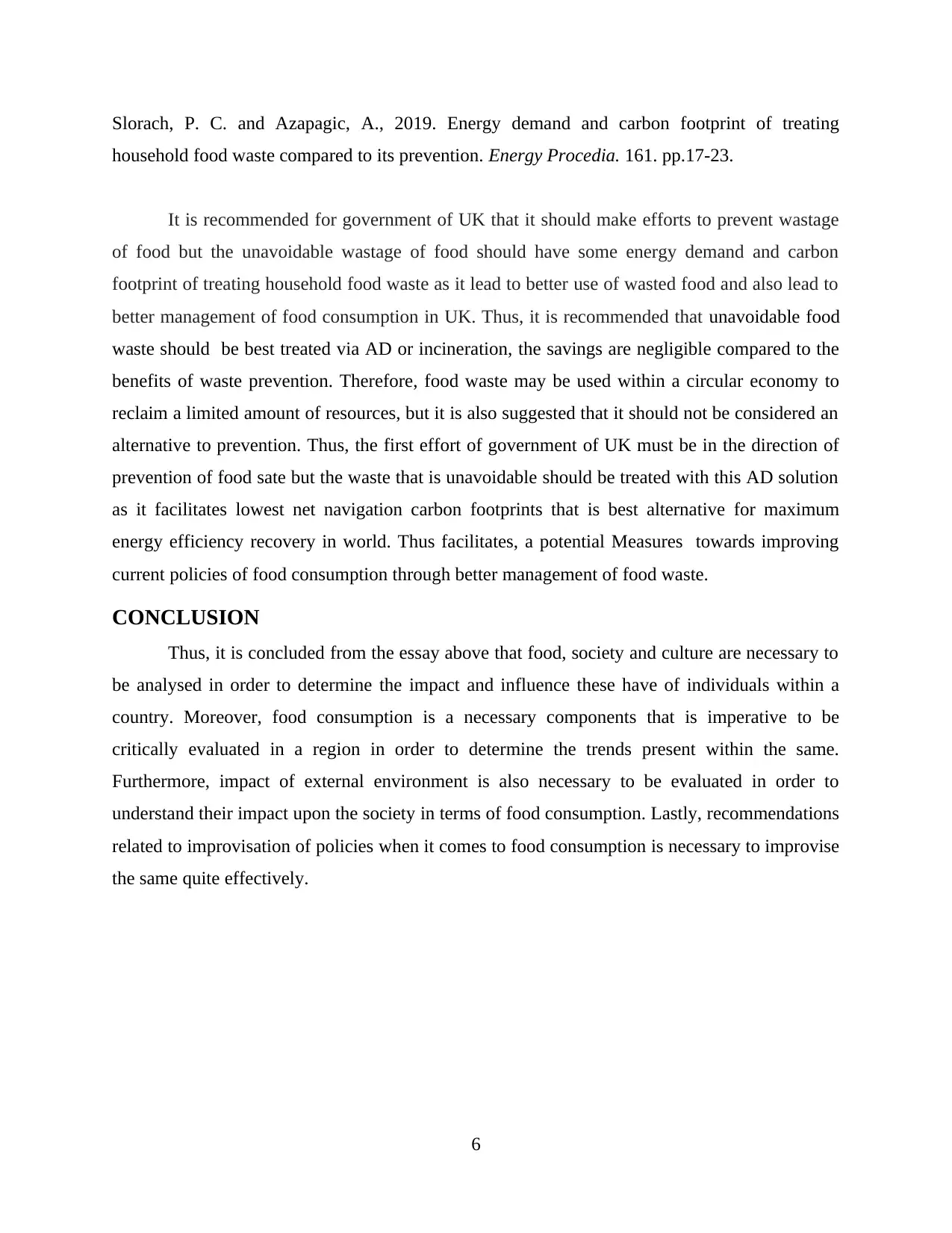
Slorach, P. C. and Azapagic, A., 2019. Energy demand and carbon footprint of treating
household food waste compared to its prevention. Energy Procedia. 161. pp.17-23.
It is recommended for government of UK that it should make efforts to prevent wastage
of food but the unavoidable wastage of food should have some energy demand and carbon
footprint of treating household food waste as it lead to better use of wasted food and also lead to
better management of food consumption in UK. Thus, it is recommended that unavoidable food
waste should be best treated via AD or incineration, the savings are negligible compared to the
benefits of waste prevention. Therefore, food waste may be used within a circular economy to
reclaim a limited amount of resources, but it is also suggested that it should not be considered an
alternative to prevention. Thus, the first effort of government of UK must be in the direction of
prevention of food sate but the waste that is unavoidable should be treated with this AD solution
as it facilitates lowest net navigation carbon footprints that is best alternative for maximum
energy efficiency recovery in world. Thus facilitates, a potential Measures towards improving
current policies of food consumption through better management of food waste.
CONCLUSION
Thus, it is concluded from the essay above that food, society and culture are necessary to
be analysed in order to determine the impact and influence these have of individuals within a
country. Moreover, food consumption is a necessary components that is imperative to be
critically evaluated in a region in order to determine the trends present within the same.
Furthermore, impact of external environment is also necessary to be evaluated in order to
understand their impact upon the society in terms of food consumption. Lastly, recommendations
related to improvisation of policies when it comes to food consumption is necessary to improvise
the same quite effectively.
6
household food waste compared to its prevention. Energy Procedia. 161. pp.17-23.
It is recommended for government of UK that it should make efforts to prevent wastage
of food but the unavoidable wastage of food should have some energy demand and carbon
footprint of treating household food waste as it lead to better use of wasted food and also lead to
better management of food consumption in UK. Thus, it is recommended that unavoidable food
waste should be best treated via AD or incineration, the savings are negligible compared to the
benefits of waste prevention. Therefore, food waste may be used within a circular economy to
reclaim a limited amount of resources, but it is also suggested that it should not be considered an
alternative to prevention. Thus, the first effort of government of UK must be in the direction of
prevention of food sate but the waste that is unavoidable should be treated with this AD solution
as it facilitates lowest net navigation carbon footprints that is best alternative for maximum
energy efficiency recovery in world. Thus facilitates, a potential Measures towards improving
current policies of food consumption through better management of food waste.
CONCLUSION
Thus, it is concluded from the essay above that food, society and culture are necessary to
be analysed in order to determine the impact and influence these have of individuals within a
country. Moreover, food consumption is a necessary components that is imperative to be
critically evaluated in a region in order to determine the trends present within the same.
Furthermore, impact of external environment is also necessary to be evaluated in order to
understand their impact upon the society in terms of food consumption. Lastly, recommendations
related to improvisation of policies when it comes to food consumption is necessary to improvise
the same quite effectively.
6
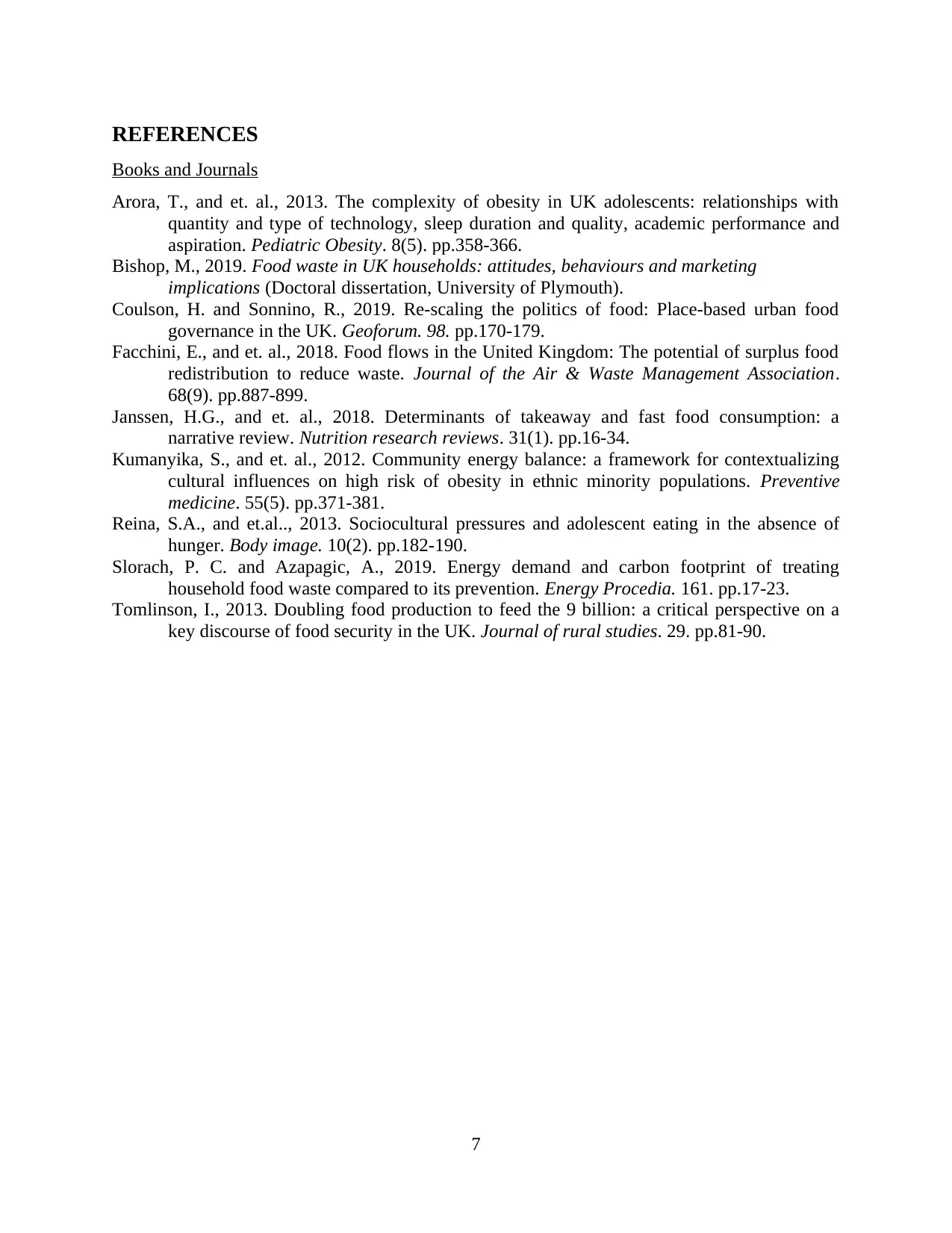
REFERENCES
Books and Journals
Arora, T., and et. al., 2013. The complexity of obesity in UK adolescents: relationships with
quantity and type of technology, sleep duration and quality, academic performance and
aspiration. Pediatric Obesity. 8(5). pp.358-366.
Bishop, M., 2019. Food waste in UK households: attitudes, behaviours and marketing
implications (Doctoral dissertation, University of Plymouth).
Coulson, H. and Sonnino, R., 2019. Re-scaling the politics of food: Place-based urban food
governance in the UK. Geoforum. 98. pp.170-179.
Facchini, E., and et. al., 2018. Food flows in the United Kingdom: The potential of surplus food
redistribution to reduce waste. Journal of the Air & Waste Management Association.
68(9). pp.887-899.
Janssen, H.G., and et. al., 2018. Determinants of takeaway and fast food consumption: a
narrative review. Nutrition research reviews. 31(1). pp.16-34.
Kumanyika, S., and et. al., 2012. Community energy balance: a framework for contextualizing
cultural influences on high risk of obesity in ethnic minority populations. Preventive
medicine. 55(5). pp.371-381.
Reina, S.A., and et.al.., 2013. Sociocultural pressures and adolescent eating in the absence of
hunger. Body image. 10(2). pp.182-190.
Slorach, P. C. and Azapagic, A., 2019. Energy demand and carbon footprint of treating
household food waste compared to its prevention. Energy Procedia. 161. pp.17-23.
Tomlinson, I., 2013. Doubling food production to feed the 9 billion: a critical perspective on a
key discourse of food security in the UK. Journal of rural studies. 29. pp.81-90.
7
Books and Journals
Arora, T., and et. al., 2013. The complexity of obesity in UK adolescents: relationships with
quantity and type of technology, sleep duration and quality, academic performance and
aspiration. Pediatric Obesity. 8(5). pp.358-366.
Bishop, M., 2019. Food waste in UK households: attitudes, behaviours and marketing
implications (Doctoral dissertation, University of Plymouth).
Coulson, H. and Sonnino, R., 2019. Re-scaling the politics of food: Place-based urban food
governance in the UK. Geoforum. 98. pp.170-179.
Facchini, E., and et. al., 2018. Food flows in the United Kingdom: The potential of surplus food
redistribution to reduce waste. Journal of the Air & Waste Management Association.
68(9). pp.887-899.
Janssen, H.G., and et. al., 2018. Determinants of takeaway and fast food consumption: a
narrative review. Nutrition research reviews. 31(1). pp.16-34.
Kumanyika, S., and et. al., 2012. Community energy balance: a framework for contextualizing
cultural influences on high risk of obesity in ethnic minority populations. Preventive
medicine. 55(5). pp.371-381.
Reina, S.A., and et.al.., 2013. Sociocultural pressures and adolescent eating in the absence of
hunger. Body image. 10(2). pp.182-190.
Slorach, P. C. and Azapagic, A., 2019. Energy demand and carbon footprint of treating
household food waste compared to its prevention. Energy Procedia. 161. pp.17-23.
Tomlinson, I., 2013. Doubling food production to feed the 9 billion: a critical perspective on a
key discourse of food security in the UK. Journal of rural studies. 29. pp.81-90.
7
⊘ This is a preview!⊘
Do you want full access?
Subscribe today to unlock all pages.

Trusted by 1+ million students worldwide
1 out of 9
Related Documents
Your All-in-One AI-Powered Toolkit for Academic Success.
+13062052269
info@desklib.com
Available 24*7 on WhatsApp / Email
![[object Object]](/_next/static/media/star-bottom.7253800d.svg)
Unlock your academic potential
Copyright © 2020–2025 A2Z Services. All Rights Reserved. Developed and managed by ZUCOL.





